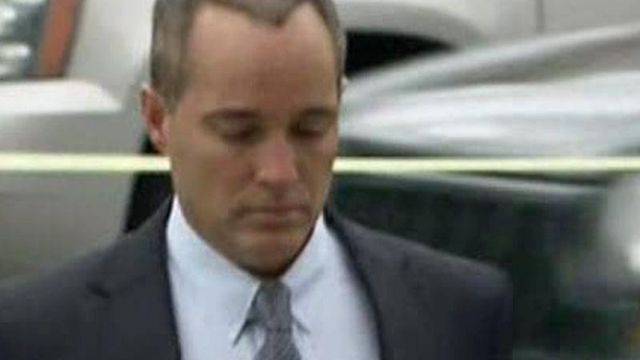Trial pits Edwards against former top aide
Whether jurors convict John Edwards of violating federal campaign finance laws could come down to which admitted liar they believe - the former presidential candidate or his one-time aide Andrew Young.
Posted — UpdatedEdwards faces six charges that he arranged for two wealthy campaign donors to pay nearly $1 million to hide his pregnant mistress, Rielle Hunter, from the media during his 2008 bid for the White House.
As the trial began in earnest Monday, the defense team quickly laid out their strategy to convince the eight-man, four-woman jury that Young was the man who arranged the payments and was the main beneficiary of the money. Edwards, they said, wasn’t aware of the bulk of the payments, and the remainder shouldn’t be considered a campaign contribution.
“What Andrew Young did, he did for a purpose,” defense attorney Allison Van Laningham said in her opening statement. “John Edwards was his ticket to the top.”
Jurors should be able to gauge that purpose soon, as Young was the first witness called in the case.
He testified for about 90 minutes Monday afternoon about how he became acquainted with Edwards shortly before Edwards was elected to the U.S. Senate in 1998 and how their relationship evolved over time from one where he was an employee to one where he became a close confidant who helped organize Edwards’ first presidential bid in 2004.
As Edwards was building a base for second run at the White House, Young introduced him to Rachel “Bunny” Mellon, a Virginia socialite who was convinced Edwards was the second coming of John F. Kennedy and was willing to do anything to help him become president.
“She felt he would be the savior of America,” Young said, recalling the fervor Mellon, now 101, exhibited for the Edwards campaign.
Edwards sat forward in his chair, listening intently to Young’s testimony and making frequent notes about it.
Young also recalled his first meeting with Hunter in September 2006 at Dulles International Airport outside Washington, D.C., where he went to pick up Edwards for a trip to Mellon’s estate. Hunter had been hired by the campaign a few months earlier to produce videos about Edwards, and Young said there had been gossip among the staff about her close relationship with Edwards.
Young said he had overheard some “suspicious conversations” on the phone between Edwards and Hunter as he drove the candidate around in the preceding months, and while they spent the night at a hotel near Dulles, he heard Edwards in the background as he talked to Hunter on the phone from her room.
“To me, that confirmed it … that they were having an affair,” he said.
Young is expected to continue testifying Tuesday.
Prosecutors set him up as their star witness – someone who could lay out the conspiracy they allege Edwards engaged in to protect his campaign from the ruin an extramarital affair would mean.
“Ambition is an important quality for a politician, but too much ambition can be a dangerous thing,” David Harbach, a lawyer with the U.S. Department of Justice, told jurors in his opening statement, adding that Edwards was determined not to let anything stand in his way.
Hunter was “a loose cannon” who needed to be kept quiet, Harbach said, so Edwards had Young solicit campaign donors for money to support her. Edwards used a practice of “deny, deceive and manipulate” to distance himself from the secret payments and maintain secrecy about the affair, the prosecutor said.
Edwards later convinced Young to publicly claim paternity of Hunter’s daughter to thwart the growing media speculation about an affair as Edwards campaigned in the early 2008 primaries, Harbach said. Edwards admitted the affair months later, only after Mellon’s lawyer questioned the numerous checks she had sent to Young on Edwards’ behalf and halted further payments, Harbach said.
“John Edwards is a man who has committed many sins but no crime,” van Laningham told jurors. “We’re not asking you to like his behavior. We’re asking you not to convict him for it.”
Edwards hid his affair to save himself and his wife, Elizabeth, who was dying of cancer, from embarrassment, van Laningham said, just as anyone else guilty of cheating on a spouse would do.
“He wasn’t hiding the affair for a political purpose,” she said. “He was hiding it to avoid humiliation.”
Van Laningham contended that that Young and his wife milked Mellon for more than $700,000 under the guise that the money would help Edwards’ campaign. Instead, they used most of it to help pay for a $1.5 million house they were building in Chapel Hill and fund a lavish lifestyle for themselves, she said.
“Follow the money,” she repeatedly instructed jurors.
The money trail from Mellon and a separate trail from Fred Baron, a Texas lawyer who was Edwards’ campaign finance director, intersect at Young, she said.
Young asked Baron for money to ferry him and his family across the country with Hunter to escape media scrutiny in early 2008, and van Laningham noted that Baron continued to provide financial support to Hunter long after Edwards halted his campaign.
“This money was not given for the purpose of influencing an election,” she said, citing a necessary element prosecutors must prove to convict Edwards.
• Credits
Copyright 2024 by Capitol Broadcasting Company. All rights reserved. This material may not be published, broadcast, rewritten or redistributed.





